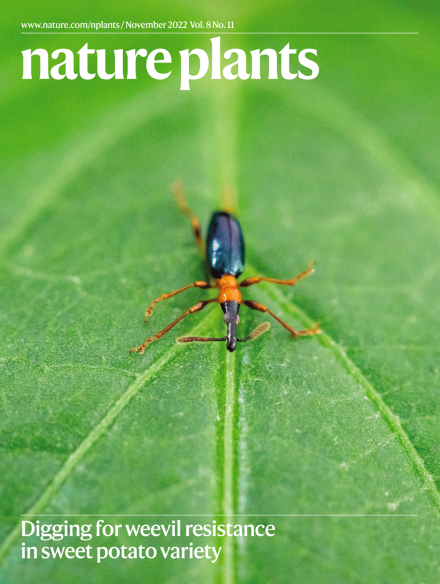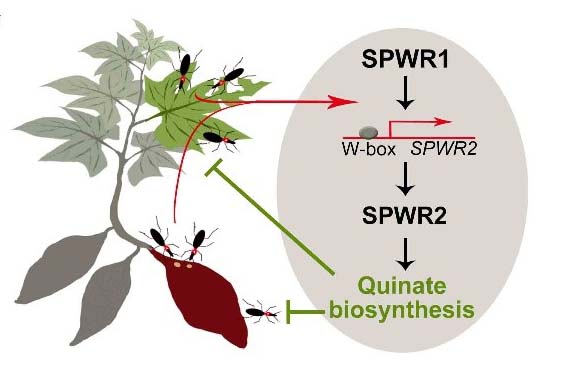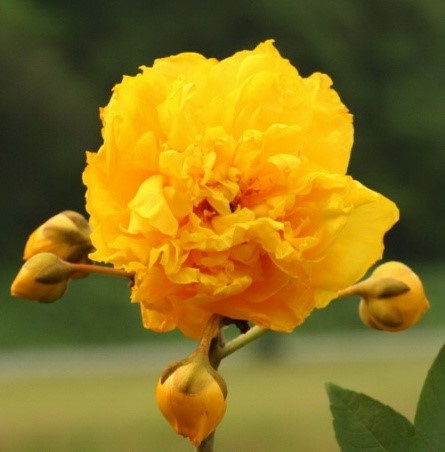

Sweet potatoes (Ipomoea batatas L.) are an important cash crop in the world, and China is the world's largest producer, consumer, and exporter of sweet potatoes, accounting for more than 60% of the world's total production. Sweet potato planting areas are mainly distributed in tropical and subtropical regions, and frequent pests have become the main factors restricting sweet potato production. Sweet potato weevils are the most harmful pests in sweet potato cultivation and are also important international quarantine pests, which cause great harm to sweet potatoes during planting and tuber storage by biting leaves and tubers, seriously reducing the yield and edible quality. Sweet potato weevils occur seriously in Asian and African areas, which cause 10%~30% yield loss and more than 50% in severe cases, and easily lead to harvest failure if improper prevention, bringing great economic losses to sweet potato production. In the sweet potato growing region of southern China, sweet potato weevils occur for many generations a year and overlap generations, and it has spread to the Yangtze River Basin in recent years due to climate warming, with a trend of expansion year by year. However, at present, there is no effective resistance resource for sweet potato weevil, and chemical control such as large-scale application of pesticides is mainly adopted, which not only increases production costs but also leads to environmental pollution and food safety. Therefore, exploring insect-resistant resources, carrying out research on the molecular mechanism, and promoting the development of technologies and breeding, are the most economical, environmentally friendly, and sustainable development directions for solving the harm of sweet potato weevil, and are also the urgent needs of the development of sweet potato industry.
In recent years, Xingliang Hou, a researcher from the South China Botanical Garden of CAS, has led a research team to focus on the genetic basis of important traits and precise breeding for sweet potatoes. Due to the poor study of sweet potato weevil resistance and the low diversity of resistance resources, the research on insect resistance mechanism is much delayed, which is called "the difficult sweet potato road". To this problem, Hou's team, in cooperation with researchers from Guangdong Ocean University, collected sweet potato materials in South China, where sweet potato weevils are prevalent, and performed their resistance evaluations. After three years of field screening, two precious germplasms were obtained with high resistance to sweet potato weevil. Afterward, they used this resistant germplasm to construct F1 genetic populations. At the same time, they overcame the difficulties of detection and instability of resistance phenotypes under controlled conditions, established a stable and controllable evaluation system for detecting resistance on sweet potato weevil, and successfully located and cloned two key genes of sweet potato weevil resistance, SPWR1 (Sweet Potato Weevil Resistance 1) and SPWR2. It is worth noting that the researchers also overcame the problems of sweet potato genetic transformation on low transformation rate and long period, and developed a new efficient and stable genetic transformation method. Subsequently, many sweet potato genetic materials were constructed and proved that both SPWR1 and SPWR2 positively regulated the resistance to sweet potato weevil. Physiological and biochemical results showed that the induced WRKY transcription factor encoded by SPWR1 specifically binds the W-box element of the promoter DNA from the resistance allele SPWR2, thereby activating the expression of the SPWR2 gene. Furthermore, the protein encoded by SPWR2 is a key synthesis enzyme of quinic acid in sweet potatoes, activating the downstream quinate derivatives to resist sweet potato weevil attack. Further insect physicochemical experiments proved that the derivative compounds with the 1-hydroxy-quinate group showed inhibitory on intestinal digestive enzymes and movement of sweet potato weevil. It is worth mentioning that quinic acid and its derivatives have no pharmacological toxicity to humans, and are not easy to remain in the environment. Natural insect-resistant variants containing high levels of quinic acid are resistant to insects, which shows us a potential, environmentally friendly, and resource-saving agricultural insect-resistance program. In conclusion, this study first cloned the natural resistance genes of sweet potato weevils and revealed the regulation mechanism and downstream natural resistant substances, which provide a new direction and ideas for agricultural control of sweet potato weevils. The multi-resistant sweet potato molecular breeding is greatly important to promote the basic research and development of high-value ecological agriculture and the sweet potato industry.
The paper was published as the cover story in the international journal Nature Plants (www.nature.com/articles/s41477-022-01272-1), and the research was supported by projects such as the National Natural Science Foundation of China - Guangdong Provincial Joint Fund (U1701234) and the Guangdong Special Support Program for Young Top-notch Talents (2019TQ05N140).Professor Xu Liu from the South China Botanical Garden of CAS is the first author of this paper, Master Yaru Wang, Graduate student Mei Guoguo, Dr. Yinyin Liao, and Associate Professor Hongbo Zhu from Guangdong Ocean University, are the co-first authors of this paper, and Professor Xingliang Hou is the corresponding author of the paper.



